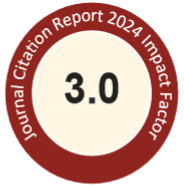Keywords
Corneal epithelial cells, Protocorm-like bodies of Dendrobium officinale, Dry eye disease, Inflammation, Nanovesicles
Abstract
Plant-derived nanovesicles (PDNVs) offer a promising, biocompatible therapeutic platform. In this study, we isolatednanovesicles from protocorm-like bodies of Dendrobium officinale (PLBs-NVs) and evaluated their efficacy in dry eyedisease (DED) models. PLBs-NVs protected human corneal epithelial cells against hyperosmotic stress, supportedwound repair, and inhibited inflammation in vitro. In a desiccating stress-induced DED mouse model, topical PLBs-NVstreatment significantly restored tear secretion, reduced corneal epithelial damage, and lowered levels of proinflammatorycytokines. These results suggest that PLBs-NVs are a safe, natural, and effective therapeutic strategy for DED, sup-porting their potential for future clinical translation in ocular surface disorders.
Recommended Citation
Yuqing, Bao; Chengyu, Peng; Fenglei, Zhang; Yuqiang, Zheng; Mingqi, Zhang; and Wei, He
(2025)
"Nanovesicles derived from protocorm-like bodies of Dendrobium officinal enhance corneal epithelial repair and reduce inflammation in dry eye disease models,"
Journal of Food and Drug Analysis: Vol. 33
:
Iss.
3
, Article 10.
Available at: https://doi.org/10.38212/2224-6614.3559
Creative Commons License

This work is licensed under a Creative Commons Attribution-Noncommercial-No Derivative Works 4.0 License.
Included in
Food Science Commons, Medicinal Chemistry and Pharmaceutics Commons, Pharmacology Commons, Toxicology Commons


Abstract Image